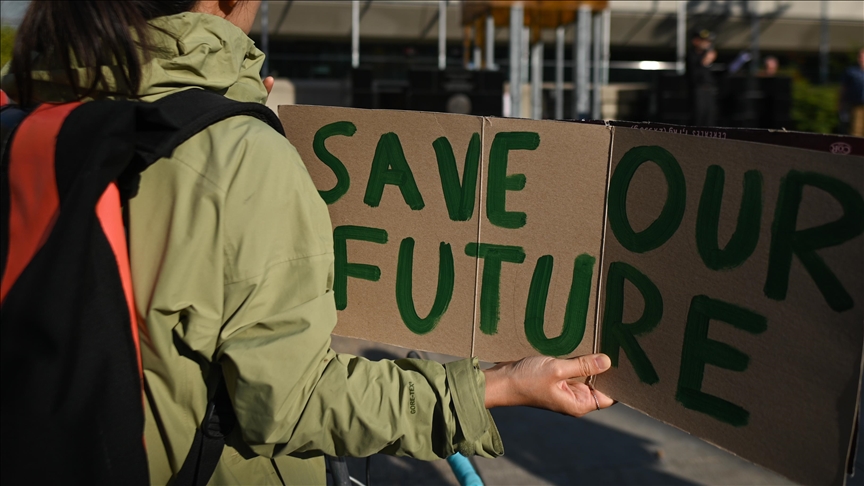Global climate inaction: ‚ÄòChange will either happen by disaster or design‚Ä�
Tackling environmental crises requires a fundamental shift from symptoms to root causes by altering societal values and structures, researchers say

- Tackling environmental crises requires a fundamental shift from symptoms to root causes by altering societal values and structures, researchers say
- ‘We can’t keep living in these systems as they’re functioning now. Change will either happen by disaster or by design,’ warns Caitlyn Eberle of UN University’s Institute for Environment and Human Security
- ‘We can shift our mindset from the idea that humans are separate from nature … We are not above nature, so we have to realign our relationship,’ Irmak Karakislak, co-lead author of the 2025 Interconnected Disaster Risks report
ISTANBUL (AA) – Humanity faces a crucial choice: proactive change “by design” or reactive change through environmental disaster, according to leading experts from a newly published United Nations University report.
The researchers argue that addressing global crises requires a fundamental shift from merely managing symptoms to transforming society’s underlying structures and assumptions.
“Something is going to happen, and we can’t keep living in these systems as they’re functioning now. Change will either happen by disaster or by design,” warned Caitlyn Eberle, senior researcher at the UN University’s Institute for Environment and Human Security (UNU-EHS) and one of the lead authors of the 2025 Interconnected Disaster Risks report.
Released last month, the report outlines why intentional, systemic transformation is critical for preventing catastrophic environmental tipping points.
“Disaster would be these tipping points being reached ... That would be a really bad scenario,” Eberle told Anadolu.
“So, our report is really talking about making those changes by design … There is no other option.”
‘Getting down to the root of the problem’
At the core of the report lies a compelling question: if the solutions to environmental problems are known, why is meaningful progress not being made?
The researchers argue that current efforts are too narrowly focused on symptoms rather than addressing root causes.
Eberle explained the report’s central analogy: “It talks about society as kind of like a tree. We see climate change and pollution as the rotten fruits of this tree, and the way to fix it is not by just pruning off and addressing the symptoms … but rather getting down to the root of the problem in our assumptions and beliefs about how the world works.”
For instance, recycling plastic alone will not solve the pollution crisis. Instead, the researchers urge addressing the root cause: drastically reducing plastic production itself.
Similarly, they say temporary solutions such as geoengineering or atmospheric interventions should only supplement primary strategies like significantly reducing fossil fuel dependence to tackle global warming.
‘We are not above nature’
A fundamental root cause highlighted by the researchers is the problematic perception that humans hold regarding their relationship with nature.
Irmak Karakislak, a senior expert at UNU-EHS and another lead author, pinpointed a major flaw in human thinking: “One of the main underlying assumptions … relating to climate change, comes from the idea that humans are superior to nature or that we are separate from nature.”
The report advocates for a radical shift away from this damaging perspective. “What our report shows is that … we can shift our mindset from the idea that humans are separate from nature to one where humans are one with nature,” Karakislak explained.
“We are not above nature, so we have to realign our relationship.”
To achieve such profound transformation, the authors introduce what they call a “Theory of Deep Change,” which distinguishes surface-level adjustments from deeper transformations in society’s core assumptions and institutions.
According to the researchers, meaningful transformation requires activating both “inner levers” and “outer levers.”
Inner levers involve fundamental shifts in individual and collective mindsets – cultivating values such as interconnectedness, responsibility, and empathy.
“One of the stronger … inner levers that our report shows is care,” Karakislak said, emphasizing that transformation becomes achievable “when we start to care about others, our neighbors, our community, our planet, and also future generations.”
Outer levers involve more tangible systemic actions such as policy shifts, international agreements, technological innovation, and reform in education and governance.
Change is ‘entirely within our power’
The researchers recognize the power wielded by large corporations, many of which are major emitters and influential actors in shaping public opinion. However, they emphasize that individuals collectively hold considerable influence.
“It’s important to remember that the whole of society is made up of individuals,” Eberle noted.
“If we can shift our own opinions about how we treat nature, it becomes much easier for us to perform these outer levers like … supporting legislation that allows (a river to flow freely), or taking care of biodiversity.”
Acknowledging the challenge, Eberle added that even incremental progress matters significantly: “Every step in the right direction is a good one, and it’s pushing society further.”
In response to widespread feelings of powerlessness, Karakislak reminded people that “change is always a radical idea until it becomes a reality.”
She cited the Montreal Protocol, which came into effect in January 1989 and successfully phased out ozone-depleting substances, as “a very great example of how multilateral action can facilitate change.”
“It’s easy to feel very hopeless,” Eberle admitted. But she remained hopeful, asserting: “The report really shows us that positive change is already happening and that human-made problems like climate change, pollution and biodiversity loss, can be unmade. We can unmake them and it is entirely within our power to change.”
Anadolu Agency website contains only a portion of the news stories offered to subscribers in the AA News Broadcasting System (HAS), and in summarized form. Please contact us for subscription options.




